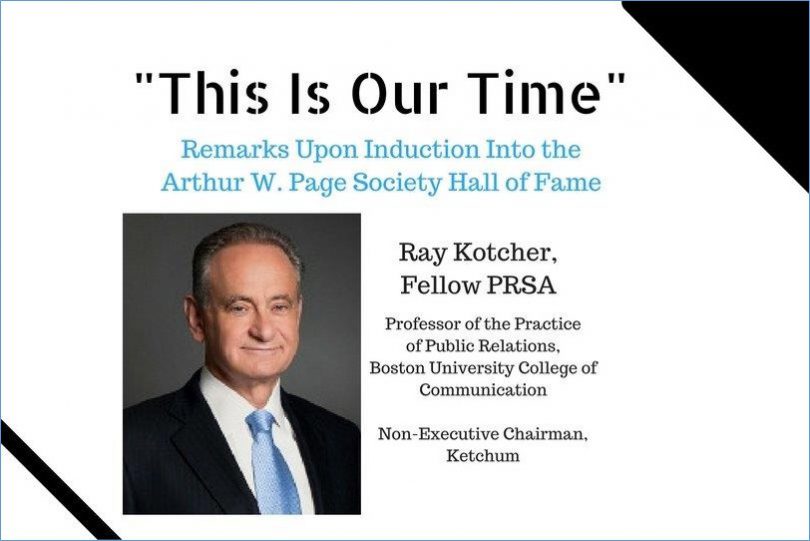Ray Kotcher, Fellow PRSA, PRSA Advisory Board member, was inducted into the Arthur W. Page Society Hall of Fame on Sunday, Sept. 11, and shared a moving acceptance speech, entitled, “This Is Our Time.” The full speech is available below, and outlines areas of opportunity within the industry.
Kotcher is known to many in the industry for his leadership and dedication to the public relations profession — whether for his more than 30 years at Ketchum where he is now the agency’s non-executive chairman; his new role as professor of the practice of public relations at the Boston University College of Communication; or his many professional achievements.
Remarks Upon Induction
Dave, thank you for those generous words. We have known one another and worked together for more years than I can count. Dave is a Ketchum alum. And it fills me with pride, Dave, to see how you have ascended to a position of leadership in this industry that we all love so much.
When Bill Nielsen called in June to tell me of the decision to include me in the Page Hall of Fame, I was lugging a suitcase up the stairs of a hotel in Hudson, New York. My wife Betsy and I had just arrived there to celebrate our son’s wedding. Yesterday, here in London, Betsy and I celebrated our 38th wedding anniversary. Betsy, thank you so much for your love, never-failing support and partnership through the years. We did it together and we share this honor.
Weddings. Anniversaries. There seems to be great joy that comes along with the Page Hall of Fame.
Aedhmar, you certainly have earned the Distinguished Service Award and, as we both are agency citizens, I am particularly pleased to share the podium with you this evening. Having served alongside you at the Society over the years, I have seen first-hand how your prodigious intellect and hard work have contributed to our profession. Congratulations.
Being recommended by the Honors Committee and confirmed by the trustees means everything to me. And to stand alongside pioneers — giants of public relations and communications — including Harold Burson, Larry Foster, Marilyn Laurie, Daniel Edelman, Bill Nielsen, Jon Iwata, as well as my predecessor as CEO of Ketchum, Dave Drobis, who was inducted into the Hall of Fame eight years ago, this is the greatest honor of my professional life. Bill Nielsen, a particular “thank you” to you for our talks and your counsel.
I also would like to acknowledge Page member Karen VanBergen who is here this evening and is the CEO of the Omnicom Public Relations Group. I could not have done it — indeed, Ketchum could not have done it — without the support of Omnicom.
And to Roger, please accept my gratitude for your personal support through the years, your deep belief in Page, all you contribute to our discipline, and your passion for our work.
As I prepared to speak with all of you this evening and looked back at the arc of our profession and where past Hall of Fame inductees — true trailblazers — have led us, and as I consider our future, I am filled with great optimism.
For those of you attending dinner in London this evening — today’s leaders in corporate communications, of agencies, in public relations education — to all of our accomplished members around the world – for the work that we do, this is our time.
They are exciting times, amazing times. But they are complicated times.
Consider that every single second, at the crossroads of human communication and technology, 2.5 million emails are sent.
In a second.
193,000 text messages.
219,000 posts are added to Facebook. 4,629 photos to Instagram. 30 seconds of video to YouTube. 7,259 tweets.
All in a single second.
We are undergoing a revolution in human communication. In fact, it is a revolution in the human experience — every bit as profound as fire, the wheel or the alphabet.
At the same moment, propelled in part by this revolution in human communication, the world’s geographic balance of power is being reformed. There is a shift in the world’s demography. Millions are on the move from the Middle East to Europe, across Eurasia and the African continent and in North America. Access to resources is an increasing challenge — water for example; access to fundamental human needs and rights, such as health care, nutrition and education. Struggles such as gender, racial, ethnic and religious equality. Economic disparities. And people are seeking — demanding — transparency and purpose from institutions, everywhere.
For the discipline of which we are all a part, this macro complexity is driving transformation and putting in front of us the greatest opportunities in our history.
Today’s world — with all of its vicissitudes — is a world that is made for us.
But opportunity doesn’t come without challenge. As communicators we need to do everything we have always done — but with greater skill, with greater speed and on a greater scale. And the mission of this great organization, the Arthur W. Page Society — to enrich and advance the leadership role of communicators — has never been more relevant.
Today we tell our stories in an ongoing global conversation that moves at the speed of light.
Yet, ideas remain at the very heart of what we do. It is our narratives that empower us. As Arthur Page himself wrote in a letter to a colleague more than 60 years ago — and this is verbatim — “public relations is the art of telling a good story well.”
Now more than ever, our narratives must be authentic, more clear, more compelling. We succeed based on the singularity and veracity of our ideas.
We can move an individual, whole organizations, whole communities to share a way of seeing the world. We succeed when we connect with people.
But our work also can form factions. The channels we work in can become walled off. Ideas can do good — or not.
Building common belief is an awesome power and responsibility, and we must handle it with care.
So amidst this all-encompassing change — taking place at the speed of light, how does an institution succeed? Its leaders? And what is the role of communicators and communications?
These questions have been asked of CEOs in a number of recent, important studies. And time and time again the answer comes back that business leaders are focused on and value institutional reputation and communications more than ever. They have come to realize that it is integral to their organizations’ success and to their success.
For example, at the World Economic Forum’s 2015 Davos summit, the Said Business School at Oxford University, in partnership with Heidrick & Struggles, introduced the findings of The CEO Report, based on face-to-face interviews with 150 global chief executives.
They believe in (an) authentic sense of purpose for their organizations and aligning in order to achieve it. Given intense stakeholder scrutiny, they are looking for new ways to communicate effectively. They say the old models don’t work. They never were trained to be “communicator-in-chief,” one says. And that’s verbatim. It’s about hypervisibility. “Forget what you learned at B-school,” says another. “There are more audiences, more languages, more modes.”
It is our time.
In PwC’s 19th Global CEO Survey presented just eight months ago at this year’s Davos summit, more than 1400 CEOs from 83 countries spoke of greater expectations from stakeholders, operating in society, and of their belief that transparency and trust are critical. They see a need for consistent, dependable communication, and for applying data and analytics to express performance around business and strategy, purpose and values. Nearly half are rethinking how they communicate “brand.”
As is clear in these studies — and many others — as well as our very own recently released Page report, The New CCO: Transforming Enterprises in a Changing World, the need for effective strategic communications and communications leadership has never been more central. From communicators in corporations, to those working in influential not-for-profit and government institutions, to their agency advisors, the demands on us have never been greater. Our work never more important. Our value never higher. The purpose of the Page Society never more pertinent.
This is our time.
From narratives rooted in sound strategy, to real-time content creation, to participating in the global dialogue in this hyper-transparent world, to navigating the intricacies of transformational media platforms, to building lasting and trusting relationships with stakeholders and confidence in our institutions, to creating social value, to leading through the inevitable crisis, to forging culture and alignment, to interpreting the liquid world of new influencers, to leveraging the power of research, measurement, data and analytics, to collaborating confidently with integrated teams — this is the sweep and scope of the work of today’s communicators. This is the work being done by our accomplished members.
This is our time.
I would like to share with you the story of a young friend, Mahmoud Jabori. As we do, Mahmoud believes deeply in the importance and impact of communication. This is a story for our time.
Born in the Palestinian city of Hebron, Mahmoud was a communication major at Champlain College in the States and now is doing his graduate work at the Fletcher School of Law and Diplomacy at Tufts University in Boston.
The story, in his own words, goes like this:
“Growing up in a tense and divided place like the Palestinian city of Hebron makes life hard to live, hard to accept, and hard to imagine beyond the daily realities.
“As a child, I was lucky because I dared to dream despite the odds, and because I had parents who taught me the value of work. At the age of eleven, while selling small household items at a street stand, I dared to believe I could have a brighter future — and help create one for others. The stand was wedged between two checkpoints that divided the northern and southern parts of my hometown.
“Every day during my summer working at the stand, I ate lunch with children my age. Children who had to work to help provide for their families. The bread that we shared made us brothers, not only in our daily work but also in our dream for a better life.
“Although we became brothers, unlike most of them, I had a chance to go to school. And because I was privileged enough to be getting a formal education, I aspired to become their voice and to be their advocate both in Palestine and around the world.”
His goal is to return to his native Palestine with all that he has learned and apply it. He wants to build bridges.
Mahmoud says, “We have been empowered by technological and intellectual tools. They have paved the way for us to become committed and engaged global citizens who share a responsibility toward challenges that face our communities, our peoples, and our world.”
Mahmoud believes in the primacy and power of communication.
For Mahmoud – for all of us – this is our time.
But there is something else, something of supreme importance.
Character counts. It’s about integrity.
When everyone is able to create or react by the tap of a finger, when everyone knows everything, doing our work to the highest moral standards is not just a value — it is a practical necessity. In this constantly morphing landscape, a strong sense of integrity must be the core value of our work. In a world of hyper-transparency, this is particularly true. We must do it right — with verity, credibility, truthfulness.
High standards must remain our guiding principle. For us and those to come, this is the clear path to continued, sustainable success for our great profession.
At Ketchum — and in many of the other great agencies — this commitment is at our core. I am fortunate to have worked at a firm where we demand this commitment of ourselves and in our work for our clients. Indeed, at Ketchum, as you look across our 93 years and across Ketchum’s leadership, you will find this abiding commitment to the highest standards. We believe this responsibility is incumbent on every one of us in the agency business and in our field. Today, nearly all of Ketchum’s leadership everywhere around the world is working to continue to advance the profession and its standards. At Ketchum this is not something that we just say — it is something that we do. And as the Page Principles guide us, it is 90 percent doing and 10 percent talking about it.
And then, of course, there is the work. For thirty years, I have been able to do work that I love at a place that I love. Today, Ketchum CEO Rob Flaherty’s contagious excitement for the work has lifted the agency to new levels. You will see that reflected in this London meeting which he is chairing and directing so magnificently. And with Ketchum’s president, Barri Rafferty, they have imbued the agency’s work — indeed all of Ketchum — with a sense of high purpose.
In 2008 and 2009, I served as chair of the Council of Public Relations Firms — today it’s called the PR Council. It is the association that looks after the interests of the agency business in the States. In that role, I was privileged to view broadly the agency world and many of its leaders. I experienced first-hand their standards, professionalism and deep commitment to their employees and clients.
For more than 100 years, all of us — agencies, clients and educators, working together around the world through mutuality of endeavor — defined a new industry. Important professional organizations and groundbreaking degree programs were created. Great firms and legendary communications departments were born and have grown. We have built strategic, client-agency partnerships that drive performance. We have set standards for our discipline and developed and shared knowledge and best practices.
We have come far together. Yet there is much that remains to be done. In a moment wrought with social and political complexity, economic and business volatility, technological and media disruption, financial constraints — let all of us in this room and the industry everywhere remain committed to our common interests.
Let us leverage our collective strength and with the spirit of community that brought us to today, remain engaged with one another to further define our discipline, continue to build our value, ensure our leadership in the world of communications and marketing, and realize the opportunity that awaits us in our next 100 years.
Our time is now.
But we will not realize our great purpose without the human resource — talent. Talent with the right skills and character.
Indeed, as you speak with client and agency leaders, to a person, they believe that our future turns on talent and that developing our next generation is among our most important work.
As I considered how I can make a difference, I have accepted an invitation to join the faculty at Boston University’s College of Communication as professor of the practice. It is a special and meaningful opportunity. I could not be more eager to mentor and help guide our students as they carve out their own personal and unique value propositions, rooted in great work, with mastery of the skills needed for the future and grounded in deep business knowledge and ethical principles. By helping them learn to practice in this manner, I believe that high standards can be preserved and advanced in public relations for years to come. I ask that you join me in that important work and that together we ensure that we have the talent to realize the promise of our discipline’s next century.
If I may step back for one moment to my days as a graduate student at Boston University, I would like to remember a remarkable guy, Al Sullivan. Al was a gifted professor. He’s long gone now but his lessons have stayed with me for my entire career — and my life.
Al taught a class called Values and Ethics in Public Relations. Today the course is taught by our own Don Wright who holds the Harold Burson Chair at Boston University. Don is all about the development of talent. Al Sullivan was, too. And Al’s class was a tour de force. We read the great works of philosophy, religion, literature and the sciences. Al challenged our beliefs — deconstructed them, if you will. And then he gently and skillfully helped us put our belief systems back together again.
From my parents I learned the importance of being a trustworthy person. Al taught us that your work must be trusted, too. If you are trusted, people will believe you. If you are not, they won’t. You must do it right and do what’s right.
So as we consider this moment, as we work to define the future of communications and our place in it, let us make this commitment: to follow the time-tested Page principles and to allow them to serve as our guideposts. And not just say it but do it — do it the right way for the next generation, ourselves, our organizations, our field, and the commonweal.
In the 19th century, Charles Reade, a British playwright and novelist, wrote, “Sow one act, and you reap a habit. Sow a habit, and you reap a character. Sow a character, and you reap a destiny.”
Character counts. Yesterday. Today. Forever.
And the formative truths of human communication remain as true as ever. Narratives can be powerful. Ideas can change hearts and minds. Ideas can change the world.
The time is now.
Thank you again for this great honor.







